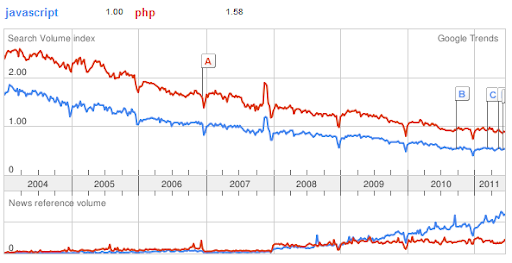Google+ has been on the news like crazy. Here all the funny stuff people came up with.
Be aware!!!! animated gifs alert. This reminds me of the web 15 years ago 😉
14/7/2011 more


7/12/2011 new animated gifs:



I started the post with those images







Google+ has been on the news like crazy. Here all the funny stuff people came up with.
Be aware!!!! animated gifs alert. This reminds me of the web 15 years ago 😉
14/7/2011 more


7/12/2011 new animated gifs:



I started the post with those images







Editor’s note: This is a guest post from Cornelius Fichtner.
A risk register is a critical project document and should not be short changed. Regardless of how well your project is planned and executed, there are always risks associated with it. The key to a successful project is being aware of those risks and documenting them so that if they materialize, they don’t completely derail the project.
Each potential risk is identified and added to the risk register. Then the risk is analyzed to decide how likely it is to occur, how much of an effect it would have and whether or not any steps should be taken to either reduce the likelihood of the risk occurring or to mitigate the possible damage.
In many cases, plans are also made on how to handle the situation if the risk occurs. This may include the steps that must be taken and who will be responsible for those actions.
Being prepared is an essential part of a successful project. Completing a comprehensive risk register, and reviewing it after each stage of the project is completed will help to keep the project on track and ensure that it s a success. A good risk register also makes it easier to keep senior management aware of the risks associated with a project so that they are not surprised.
One final note: The risk register is not part of the project management plan but it is instead “just” another project document. See PMBOK Guide, Appendix A, Table A-1.
Cornelius Fichtner, PMP
The Project Management PrepCast™ – http://www.project-management-prepcast.com
The Project Management Podcast™ – http://www.project-management-podcast.com
Is the amount of retweets really an indicator for a good #blogpost #fb
There are some people that have just a crazy amount of retweets. I'm following Jeff Bullas blog. He has usually 100-500 tweets about his blogposts. I must say he provides excellent high quality (way better than what I'm writing here). Jeff has as of today 65'068 followers (and will probably have even more by the time this post goes out). He's blogging about Social Media:
Helping business and personal brands with digital marketing including social media with Blogs, Twitter, Facebook, LinkedIn, YouTube and Search Engine Optimization. Our goal "To optimize your brand in a digital world"
Clearly he writes FOR Twitterer/Facebooker and that kind. People who are actually using or thinking about using those platforms. I would therefor argue that it's easier to gain followers and retweets when writing about Social media topics, because you are writing to the people using it. Writing a blog about dogs or cats? I bet gaining followers and therefor retweets will not be as easy, and it's not that there aren't enough dog owners out there (proof: checkout some dog blogs)!
To cut a long story short: Depending on your topic it will be easier to gain twitter followers and tweets. If you are only about your amount of twitter followers, write about Social Media or be a celebrity.
Javascript is a very strange little language that has become very powerful. Building more classical client/server application based on a Javascript/PHP will provide a better user experience and better performance and those kind of applications will scale better and they need less server power.
I'm a PHP developer. I've been developing with PHP for probably 10 years. I love PHP because it's so simple and flexible yet very powerful. In those 10 years I've done some programming in Java, I've peeked into C/C++, I got in touch with Lisp and Prolog and I have also done quit some Javascript coding. I never liked Javascript.
Javascript has been around for years. I remember when back in the day it was considered to be a thread and when it was best practice to turn JavaScript off, because it was too dangerous. Those times are long gone.
Javascript to me seems like some freak programming language intransparent and just weird and unlogic. In Javascript objects are like arrays and functions are just like variables. There is multiple ways to define methods and objects. It's just confusing. Yes you can do some jQuery stuff, which is easy, but which is not really programming (hide elements, animate elements and so on). I would rather call that "High-end-CSS". What about those sofisticated applications built with JavaScript? Just look at JavaScript libraries (like jQuery). I don't even dare trying to understand what is going on.
Javascript applications actually have a state. You load that one page with the javascript and then you can do things. You can store objects, you can manipulate objects and you don't have to pay attention to the max page execution time. You can't rely on that redeeming page refresh that will clear everything. You actually need to carefully think what you do.

Just recently I started writing a little web application (www.instalog.me). I started doing it very classical in PHP, because it's just so simple. It worked perfectly fine and it was actually fairly performant. It's only running on a cheap shared hosting. So I was thinking: "What will happen if that service would become popular?". The answer: "Caching and moving to a new bigger server."
Do I even need to use PHP? No. So I decided to build it again based on Javascript only. Taking a static HTML file and building all of the logic in Javascript. No PHP at all, as it's not needed. All of the computation will be done on the client. This will allow serving much more page requests. Looking at this globally. If people were using more Javascript running applications would need less server power and less bandwith, because you could be talking between client and server using JSON. Yes you would actually be talking about a client/server application (which in PHP only applications is not really the case). And less servers would also mean less electricity.
Maybe. But: PHP is just way too easy… Javascript just way too hard. With HTML 5 and CSS3 peaking around the corner and the mobile web becoming more and more attractive, this kind of application becomes more attractive. You have now even a local object store at your hands (way better than cookies!)! It takes though some software engineering skills to build this kind of application and you have to be an expert in Javascript! But then: You can save mother earth by saving electricity!
After all that kind of application will provide a better user experience, they are faster and they are cheaper to run, but it also takes some effort to develop.
Facebook has become THE social network. There's even a movie telling it's story. This does not stop Google from attacking Facebook. They actually already made an attempt a couple years ago with Orkut. At least here in Switzerland this was a total failur. I can't think of anybody who was actually using it. Just two or three days ago Google launched the private beta "Google+". Google's Social Network. Basicially it's Facebook but nicer and with a better concept for privacy. Plus you can actually export your Data!!!! This is really amazing. So I just exported all of my images from Picasa Web as zip file!

Beatiful. There are some really nice UI features. What you know from Facebook as lists are Circles in Google+. Adding people to Circles happens via drag an drop. Looking into circles is really cool too. Google+ looks very refreshing. Google+ looks very clean. In the past couple of months I started to worry about what I share with people on Facebook. Mostly it was just either friends/not friends. Yes they were lists, but somehow I never got around figuring out how they actually work. In Google+ circles very central. You actually have to use them. Very cool. When posting something you can choose between your circles or/and posting to the public just like Twitter. Awesome!
It's only by invitation. You can leave your e-mail address with Google and then they might invite you. I would like to give away some but Google has disabled the functionality 🙁 I'm sorry. I was one of the lucky one who could actually get one from a friend, but I can't give any… this will though change 😉 Be patient and bare with Facebook.
Stefan from the pm-blog.com are doing a survey to figure out which project management books you should read. Feel free to add new books to the list or vote on existing ones. I'm actually quite curious on what the result is going to be. As of now it looks as if the book "Der Termin. Ein Roman über Projektmanagement" by Tom DeMarco would clearly win the race.

Talking about books. We live in the mordern world. Books are somewhat old fashion. Here's an excellent blog post, "The 25 Best Projet Management Blogs". I have known of some and they are really good. I think my Google Reader list will become longer again.
there's always something wrong when doing a migration even if it's just small things. Plan for it. @rapsli
I recently successfully finished a big project. End of that project was the launch of the website. After half a year of work this was a big relieve. Careful planning should ensure that everything would go as planned. Weeks of testing should ensure that all bugs are know and eventually fixed. The involvment of different people should ensure that nothing got forgotten. Everything seemed perfect.
I hate to break the truth to yo. It's not. After launching the site and sending out the release annauncement to several thousand people we were brought back to reality. There were some bugs. Things that we have just simply forgotten because they were not directly affected by the project. Things that were not subject to any testcases. Things that were not within the project scope but were affected by it. Luckily it was nothing big. Nothing that couldn't be resolved within the day.
Keep in mind: Something will go wrong. Plan for it. Plan the unexpected
but if ye are prepared ye shall not fear
2YUAEK5QNMHG
While on a little biketour I posted the following image on Twitter.

And here's the answer to it:

rapsli: Sometimes its good to just get out and away from the computer"
Schnitzel: @rapsli away from the computer? and what is the thin on the left? 😛
It's the right side, but besides that Schnitzel is totally right. There's my little GPS computer telling me where I have to go and in my backpocket lies my iPhone tracking my progress. Two computers on less than 1 squaremeter. I guess I can't really say I'm a way from the computer.
Getting out and take a break might sometimes work wonders. It's not only designers or developers that need to be creative. The projectmanager needs to find new and better ways to lead the project to success. Despite the power and functionality of Outlook and MS Project. They will not be able to answer those questions. It's the project manager alone!
Here's a really nice video: "29 ways to stay creative".
[iframe width="560" height="349" src="http://www.youtube.com/embed/ALVzsRaJD9g"]
Let's try to be more creative and flexible. The Projectmanagement world is more than Outlook and MS Project!
jQuery has been my Javascript Library of choice for the past years. It seems as if I'm not the only one. I have come met jQuery on lots of different platforms, from PHP to Sharepoint. Everybody seems to love it. And just by the way to all those IE 7 users: Check out that V8 Javascript benchmark. IE 7 really sucks:
Google Chrome: 9021 points
IE 7: 49.4 points
Now I know why I've came to love chrome.
WebAppers have produced a really nice info graphic.

Javascript Frameworks and jQuery Infographic is brought to you by WebAppers.com
Working in an agency has taught me an important lesson about costs. As an agency you try to charge every hour of your staff to a project. After all, that's how agencys earn money. It doesn't matter what you do for the project: meetings, writing documentation, doing phone calls. Everything is charged to the client.
On the client side I'm trying to reduce costs as much as possible, because low costs will make management happy. After all they might not even grant a project if it's too expensive. So as a project manager on client side I will try to reduce the costs as much as possible so that the project looks good. It's probably a manager's most important question: How much does project xyz costs? And probably there's a nice internal PowerPoint slide explaining the costs:
$ xzy external vendor
$ abc infrastracture, hosting
$ cdf software licences
$ dfg Project management
$ asd Total
This list misses out on an important item: Internal costs. Yes, they might not be always relevant but at least for a project review they should be analyzed. Unfortunately they are often just ignored.
Scrum is not particularly helpful. Does the following scenario sound familar:
Sprint 1 – Project on track
Sprint 2 – We might have to dump some features if we want to complete on time. Oky, let's do that
Sprint 3 – We might have to dump some more features. What are the internal resources to build that feature? Ok, lets do it.
Project completed. Nice features. Costs as calculated: $ asd. Hurray. Nobody will ask internal IT how many hours they spent on the project. Nobody will ask internal staff about how much manual work they had to spend because the automatic migration didn't work as promised/planned.
So how much does the project really cost? A whole lot more, but maybe management is too scared to actually look at those costs, because it might mean that not everything is running perfectly.